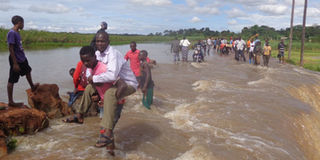Floods are back, we shouldn’t lose lives

The Climate Prediction and Application Centre, a body that monitor’s climate in the Greater Horn of Africa, has warned of more floods between June and September.
The body, that is part of the Inter-governmental Authority on Development (Igad), says a wetter than usual season is expected in eastern and central Uganda, western and central Sudan, south-western Ethiopia, south eastern South Sudan and in western Kenya.
This, therefore, means that we shall have risks of floods and landslides. In the past four months, we have witnessed increased water levels on lakes, resulting in displacement of thousands of people on islands and on the lakeshores. Rivers such as River Nyamwamba in Kasese District have burst their banks, killing people, destroying crops and property, and sweeping away bridges.
Yet it won’t stop at that.
The experts have also warned that the heavy rainfall will increase post-harvest losses; result in vector breeding, intense transmission, and possible outbreaks of malaria, Rift Valley Fever and other animal diseases.
A week ago, police used teargas to disperse protesters in Mulungu Landing Site in Ggaba, Kampala, after traders refused to leave the landing site, which had been declared inhabitable due to floods.
The government has faced difficulties getting people off water catchment areas and lakeshores because of its own failures; people settled there as authorities watched.
Also, the government has on many occasions been caught flatfooted by natural disasters. Relief and items to help the affected often arrive late and measures to prevent the occurrences are usually hushed, if not missing. Indeed, we may not be able to prevent natural disasters, but such natural occurrences can undermine the dignity and social security of citizens.
As we battle the rising cases of Covid-19, the government should think harder on how to manage the looming disasters from heavy rain amid and beyond the pandemic. And the measures should be long-lasting.
We should do the following in preparation for the rain.
Monitor news for warnings and advice. Relocate to higher grounds if you live in low-lying areas. Do not allow children to play in or near floodwaters. Avoid entering floodwaters. If you must do so, wear solid shoes and check depth and current with a stick. Stay away from drains, culverts and water a knee deep. Do not use gas or electrical appliances that have been in floodwater until checked for safety.
Other measures include preparing to move vehicles, outdoor equipment, garbage, chemical and poisons to higher areas?




